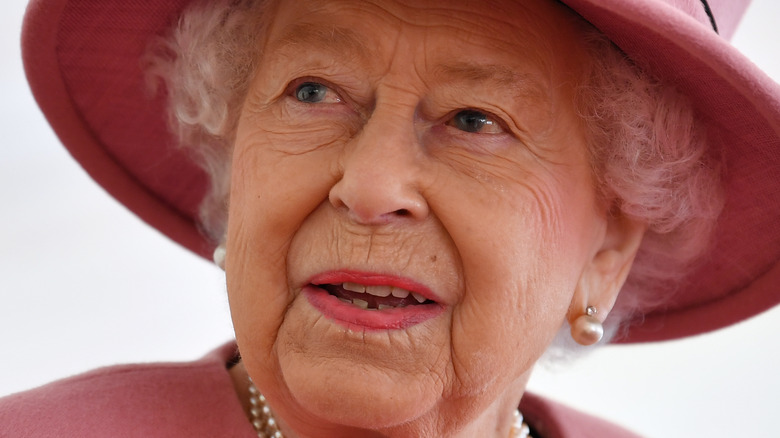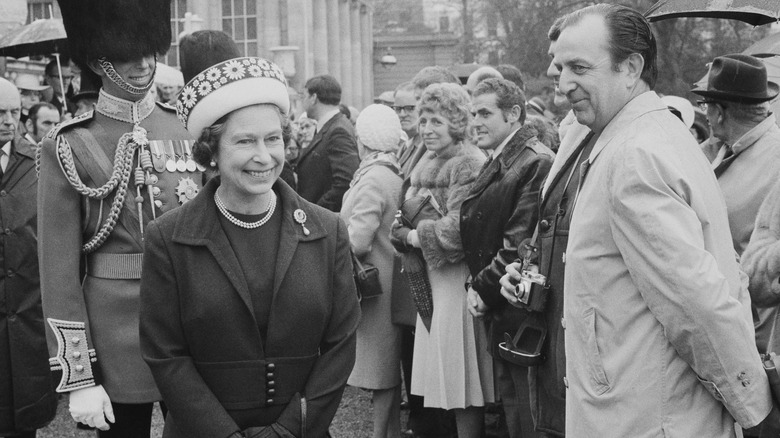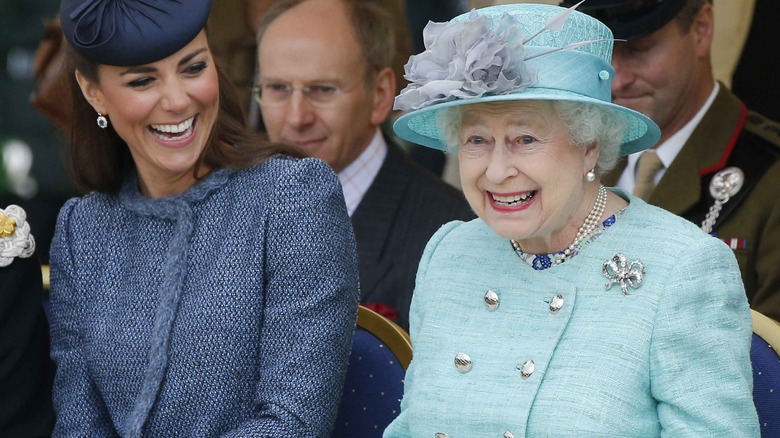This Alarming Statistic About The Queen's Subjects Puts Her Reign In A New Light
In 1947, on the occasion of her 21st birthday, Princess Elizabeth Alexandra Mary said during a tour of South Africa, "I declare before you that my whole life, whether it be long or short, shall be devoted to your service, and the service of our great imperial family to which we all belong," per the Royal Household website. Her whole life was decidedly long. By the time Queen Elizabeth II died at her Balmoral estate in Scotland on September 8, she was 96 years old. And for 70 years, Queen Elizabeth served as the constitutional monarch of the United Kingdom, the longest rule in British history. Starting with Winston Churchill, she had weekly private audiences with 15 prime ministers during her reign, per The Washington Post. She also saw the last years of the British Empire, the entirety of the Cold War, the labor shortages of the early 1970s, Brexit, and the global COVID-19 pandemic.
Perhaps that longevity is of little surprise in a family known for frequently beating the average life expectancy of every country on Earth. Queen Elizabeth's mother, the Queen Mother, died in 2002 at the age of 101. According to an analysis of the last six British monarchs and their children at The Conversation, on average, members of the royal family lived 30 years beyond other citizens. The study found healthy choices as a significant factor. But the age-defying data can mostly be attributed to good genes, medical progress, and a position of privilege.
A staggering statistic, even by the queen's standards
For all the changes in the world since the 1950s, for better or for worse, Queen Elizabeth was seemingly a fixed figure. Even though she rarely appeared in public, for many she was a comforting maternal figure who most can't remember a time without. "It is hard to believe that, after 70 years, she is no longer here with us," George Carey, who served as Archbishop of Canterbury from 1991 to 2002, wrote in The Telegraph. "Indeed, she has been the one constant element in the lives of most of us."
An analysis upon the death of Queen Elizabeth shows how true that is. According to The Washington Post, at least nine out of every 10 living human beings were born after Queen Elizabeth ascended to the throne. Using data from the CIA World Factbook, the analysis calculated the size of the population of every country aged 65 or older, which loosely aligns with the beginning of the queen's reign. According to that data, approximately 10% of the world's population is aged 65 and over, although in the U.K. and the U.S. the number is 18.5% and 16.9%, respectively. Although it's an estimate, since the category of 65 and over isn't the same thing as a precise birth date at the time of the queen's ascension to the throne in 1952, the data shows the overwhelming number of living humans on Earth have only known Queen Elizabeth as head of state.
Queen record holder
Queen Elizabeth's service as the longest standing British monarch (and having outlived most people on the face of the Earth) isn't the only record she's set. The queen has set or broken a number of Guinness and unofficial records. According to France 24, her service included traveling to more than 100 countries and making more than 150 visits to Commonwealth nations, both of which are more than any other British monarch. According to Guinness World Records, the queen also holds the record for the most countries to be head of state simultaneously, which stands at 15. Per Insider, Queen Elizabeth's face appears on 33 currencies — the most currencies featuring the same person. Also according to Guinness, Queen Elizabeth holds the record for the largest private art collection, which includes thousands of paintings and nearly a half-million photographs.
So how did Queen Elizabeth maintain her longevity to hold all those records? Bryan Kozlowski, author of 2020's "Long Live the Queen: 23 Rules for Living from Britain's Longest-Reigning Monarch," said it had a lot to do with a general rule of moderation, whether it came to workouts, diet, or alcohol. Perhaps more than anything, it was her mental fortitude that kept her going all those years. "[Elizabeth] comes from a dignity culture, where everyone was very responsible for their own emotions," Kozlowski told the New York Post in 2020. "She has this willingness to adapt. ... That contributes to longevity and a fulfilling existence for sure."


